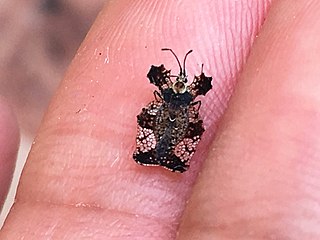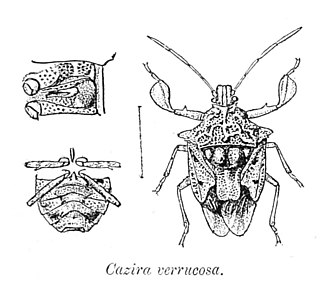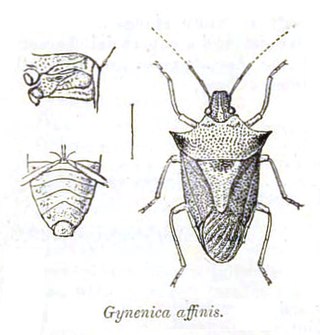
The scarce swift is a species of swift in the family Apodidae. It has a disjunct range of presence throughout the Afromontane : Cameroon line, Albertine Rift montane forests, Kenya, Tanzania, Malawi and Mozambique.

Phyllomacromia a large genus of dragonflies in the family Macromiidae. They are commonly known as cruisers.

Rhopalosiphum is a genus of aphid of the family Aphididae that includes 16 species worldwide. Apart from sucking the phloem of host plants and thereby being treated in agriculture as pests, some species are vectors for viral pathogens.

Sphedanolestes is a large genus of assassin bugs in the family (Reduviidae), subfamily Harpactorinae. There are more than 190 described species, which are found in southern Europe, Africa and Asia.

Rhynocoris is a genus of assassin bug, family (Reduviidae), in the subfamily Harpactorinae. Species are recorded from Asia, mainland Europe, Africa and North America.
Antestia is a genus of African and Asian bugs in the subfamily Pentatominae, erected by Carl Stål, 1865.

LopodytesRondani 1867 is a genus in the family Reduviidae, the assassin bugs. Members of the genus have been unofficially assigned the common name Grass Assassin bugs, but generally this name remains meaningful only to naturalists, because these insects have been too well camouflaged to raise robust public awareness.

Glymmatophora, the Metallic Assassin Bugs, is a genus of assassin bugs belonging to the family Reduviidae.

Tingini is a tribe of lace bugs in the family Tingidae. There are at least 250 genera and 2,400 described species in Tingini.

Podopinae, known as turtle bugs, are a subfamily of the insect family Pentatomidae. The type genus is Podops.

Ammianus is a genus of lace bugs in the family Tingidae. There are at least 40 described species in Ammianus.
Sinuessa is a genus of lace bugs in the family Tingidae. There are about eight described species in Sinuessa.

Dictyla is a genus of lace bugs in the family Tingidae. There are at least 80 described species in Dictyla.

Cazira is a genus of shield bugs found in the Indo-Malayan region.
Eucallipterus is a genus of true bugs belonging to the family Aphididae.

Bathycoelia is a genus of shield bugs in the subfamily Pentatominae and the monotypic tribe Bathycoeliini.

Gynenica is a genus of stink bug with about fourteen species in the Afrotropical and Oriental regions. It is one of four genera placed in the tribe Lestonocorini along with Lestonocoris, Neogynenica, and Umgababa that occur in Africa and India and feed on plants in the family Acanthaceae. Bugs in the genus have the pronotum tips extended into forward and upward curving spines. The scutellum is longer than broad, the apex with a rounded point and not reaching beyond the middle of the abdomen.
Spermatodes is a genus of shield bugs belonging to the family Pentatomidae, subfamily Pentatominae.

Acanthocoris is the type genus of the tribe Acanthocorini, erected by Amyot and Serville in 1843. Species of these leaf-footed bugs have been recorded from Africa and Asia.














